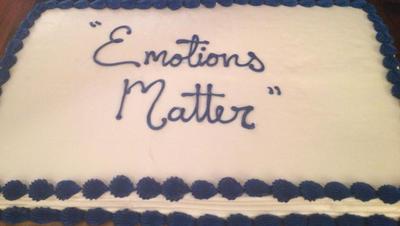Yesterday I attended a very inspiring training with Dr. Marc Brackett, Director, Yale Center for Emotional Intelligence and Co Creator of The RULER Approach to Social and Emotional Learning. This training took place with 150 educator/trainers from the Seattle Public Schools. Being in Seattle on this October rainy day was bookmarked by two tragic events, one being the school shooting in Marysville, Washington a few days ago and the other by the news of a man who killed his daughter and granddaughter the night before this training. I didn't hear about this family tragedy through the news; I learned about it when I sat down with a teacher who was sitting alone without any of her colleagues in the session. When I asked her where the members of her team were she told me that their school was dealing with the death of this girl and proceeded to tell me about this unspeakable tragedy.
After experiencing so much hope and inspiration from the training I just can't help but put these events together with the basic message of Dr. Brackett's philosophy: Emotions Matter. What are we doing in our schools to teach our children about social and emotional learning? How are they feeling cared for and seen? Given all of the stressors of our complicated society, new challenges like social media, technology, constant testing and pressures, where are the tools to navigate emotional regulation? How can we put an end to all of this horrific violence that keeps showing up in our news feeds?
I think that one place to start to answer these questions is to look to our children. When I picked my son up from school the other day and told him that there was another school shooting in our neighboring state of Washington, he said, "Mom, I think kids don't feel community, schools are so big and they feel lost. Also, the weird kids have no friends and get bullied, that's the problem." Smart kid, he pretty much nailed some of these complex issues on the head. So, what can we adults do with that wisdom?
Lets start with these three mantras that stem from work that we support at the Flawless Foundation;. "Seeing the Perfection in every child," " Kids do well if they can" and "Emotions Matter." At Flawless, our fundamental message and mission is "Seeing the perfection in every child". Though often difficult to implement, we believe that it is crucial to try to look for the light not the shadow in each child. Doesn't more patience, understanding and compassion seem like an effective elixir to help our kids feel safe and nurtured and thrive not hurt?
Another specific action that we must take is to recognize the non-negotiable importance of social and emotional learning and implement curriculum starting in Kindergarten like the RULER approach developed by the Center for Emotional Intelligence at Yale. RULER stands for Recognizing, Understanding, Labeling, Expressing and Regulating emotions. What a healthier world this would be if standardized testing included these core skills of Emotional Intelligence.
We can also embrace the powerful philosophy that "Kids do well if they can" which is the fundamental idea behind Collaborative Problem Solving, an approach to working with children reflecting an understanding that behavioral challenges, like learning disabilities, involve skills needing to be taught, not flaws in character.
There was so much hope yesterday at the training with Dr. Marc Brackett. One teacher shared an anecdote of a student who had been exposed to the RULER Approach and added "we all matter "to the mantra of "Emotions Matter." The most poignant moment out of these stories of revolutionary change was when a teacher presented a video of a group of third grade boys dancing their various emotional states using the Mood Meter part of the RULER Approach. The teacher shared with me that the most powerful aspect of this exercise was that the boy with the most intense behavioral challenges ended up being a leader. As the class was downloading after the performance and giving each other feedback, the boy being praised more than anyone else was the one with the most difficulty in this area of his development.
Turning the trouble maker into the star - This is recognizing that emotions matter. This is seeing the perfection in every child. This is understanding that kids do well if they can. This is hope.
